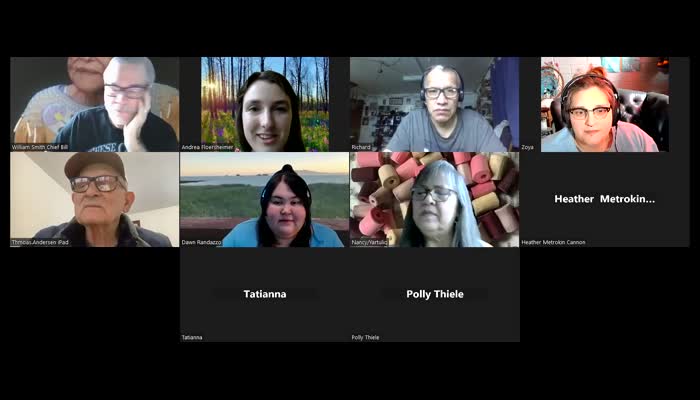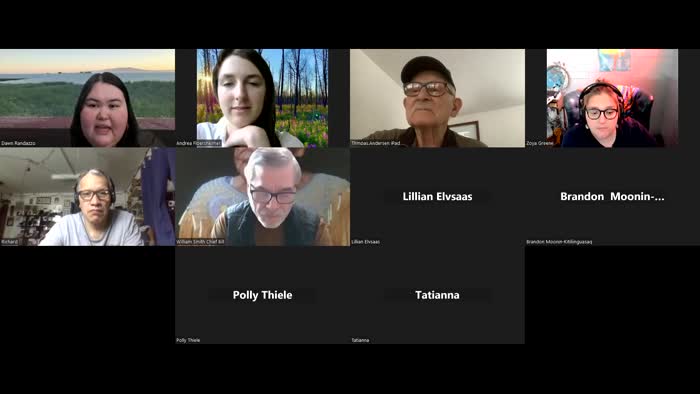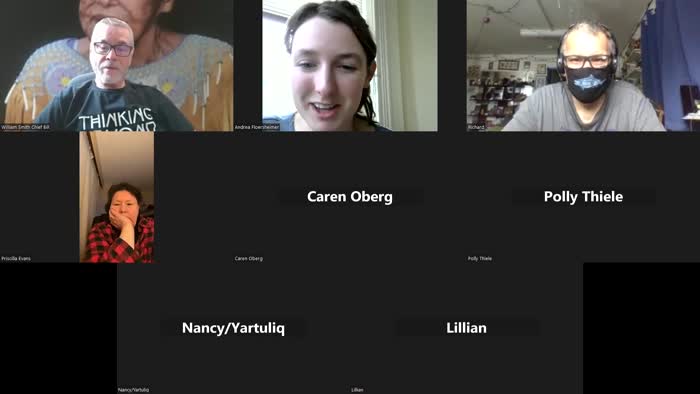Interview with Simeon Kvasnikoff Sr 2
He (Simeon Kvasnikoff) was from Port Graham, and he was talking about how his dad went to Nanwalek to go to church service and would work in the church. His parents left him in Port Graham to go starring at Nanwalek. He grew up in Port Graham and his dad worked in the cannery and they decided to live in Port Graham. His dad had a partner/friend in Nanwalek and they became very good buddies and they were singing to him down the beach when he made it to Nanwalek. His brother Phillip Anahonak (they used his nickname) used to live in Port Graham and his dad would row from Port Graham to Nanwalek and the people in Nanwalek would wonder where he was coming from. He really cared about the people from Nanwalek and Port Graham, but he didn’t live in Nanwalek as long. Everyone at that time just lived life, laughed, visited, and told stories with each other. He was young when all this was happening. He told about a person that would come in the skiff and would sell black bear skins to native people for $5. He would row and bear hunt and stop at Nanwalek and would go hunting when the tide came in or out. He had to work with the tide. He’d bring black bear, some moose, and seal, and put them on the beach and the people in the village would come down and take what they want from the animals they’d been hunting. He went to Kachemak (qaci’kmaq) and would row and go out to hunt when the tide was going out, and would come back when the tide was coming in.
(Translated by Richard Moonin, Feb 17, 2023) (00:00 - 08:09)
“Mom and dad used to walk to Nanwalek to have church service, go and star in Nanwalek in the early afternoon, then go back to Port Graham to star at night. They used to camp and wait for the tides if they wanted to travel long ways. If the tide is too high, the fish are hard to catch, and when the tide is high I hunt for seal.” - Richard Moonin, Port Graham (Paluwik)
“Before they had skiffs, they used oars. No wonder they were so strong and healthy. I remember when they used to use one oar in the back use it like a rudder. When I used to row with my brothers and we were learning to row, we used to just row in circles. They used to row with the tides to make it easier. Some things are easier to catch when the tides are lower, and some things are easier to catch when the tide is high. Salmon was always caught at the head of the bay. We were still in the era that they were maintaining old practices, and we were in the time that it changed. Now there are women hunters and things have changed.” - Lillian Elvsaas, Port Graham (Paluwik)
“In Cordova we did a lot of rowing in wooden skiffs. My uncles built skiffs. Sculling is when you row over the stern or the bow with an oar. I asked my grandmother where she was from, she was from Tatitlek and raised her children in Ellamar. When I asked her where she was from before that she shrugged. Western boundaries don’t mean anything, when I asked my grandmother about the Prince William Sound she didn’t know what that meant. The boundaries there now didn’t exist before.” - Thomas Andersen, Cordova
“My grandfather would talk about how they would travel to Kodiak. He would say “this is how Kodiak people would say it like this”. I was really young sitting on the floor hearing him talk about this. They didn’t teach girls hunting stuff, after a certain age girls weren’t taught things about hunting or allowed to talk about hunting because it could give bad luck to the hunters. It would give them bad luck if you touched their hunting gear. It was about respect for the animal that women couldn’t interfere with hunting. The men’s part in the community were different than the women’s part.” - Sally Ash, Nanwalek
____________________________________________________________________
Starting 11:15 of Simeon Kvasnikoff Interview 2:
Open Archive 3/17/2023
Attendees:
He talks about his ancestors. Somebody, perhaps his grandfather, came from Nuuciq. He wonders if the Tanapes came from Nuuciq too. Something along the lines of Runaway People coming to meet him. He describes three hole baidarkas/qayaqs (paitalek) from Yaaliq Bay. The moved from Ialik down to Kodiak. (He repeats himself for a while and talks about people traveling from place to place). He describes riding in between some big ways while traveling. He’s describes traveling somewhere (unclear where) and trying to get some wood. They would go someplace and eat a big dinner and dance where the women would wear long dresses where the women would have to hold up their dresses to keep them off the ground. They would eat together and fight over the food. He says they’re killing people and wouldn’t take anything from them. He describes not taking any of the corpse’s items to avoid inheriting bad luck. He describes people coming up from the south and ensuing fights over the land. He describes the Sugt’stun dialects clashing. He describes how now there are more Sugpiaq people on Kodiak.
“My dad used to travel. Sometimes they used the big qayaqs. A few couple of people rowing so they could go a little faster. They’d go around back here. I never heard him saying he would go to Kodiak, but they would travel between communities by rowing.” – Richard Moonin
“My mother was born in Katella in 1920. And my grandfather was in Cordova. They came to town and they were heading back and they had a small sailing boat, they had a rowboat, to try to be there when my mother was born. They left here the 1st of April and they kept on going and they kept on going. They had to travel into the wind and would stop and anchor. By the time they made it to Katella it took them a month. Time was different back then.” – Tom Anderson
“I imagine people did relocate to Kodiak. Back then they didn’t have boundaries. People traveled where they wanted to. They went where the food was sometimes.”
“We were born nomadic people until the Russian forced us to settle down.” – Brandon Moonin
“A lot of the fishermen I know would go fishing near Kodiak, and some of them never came back… they ended up living there.” -Tom Anderson
“I grew up a little boy on the boat, I have a picture being in full rain gear, had one of those fancy hats dressed all in yellow. All of us were on that little boat, I don’t know how we all fit.” – Richard Moonin


